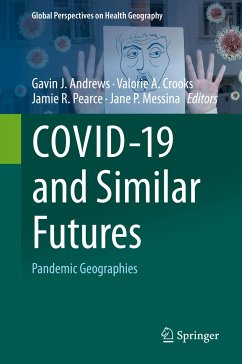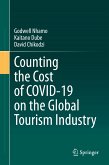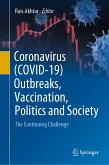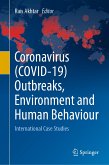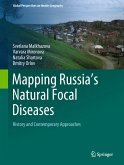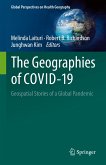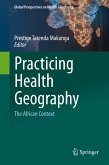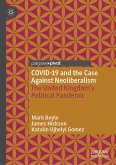COVID-19 and Similar Futures (eBook, PDF)
Pandemic Geographies
Redaktion: Andrews, Gavin J.; Messina, Jane P.; Pearce, Jamie R.; Crooks, Valorie A.


Alle Infos zum eBook verschenken

COVID-19 and Similar Futures (eBook, PDF)
Pandemic Geographies
Redaktion: Andrews, Gavin J.; Messina, Jane P.; Pearce, Jamie R.; Crooks, Valorie A.
- Format: PDF
- Merkliste
- Auf die Merkliste
- Bewerten Bewerten
- Teilen
- Produkt teilen
- Produkterinnerung
- Produkterinnerung

Hier können Sie sich einloggen

Bitte loggen Sie sich zunächst in Ihr Kundenkonto ein oder registrieren Sie sich bei bücher.de, um das eBook-Abo tolino select nutzen zu können.
This volume provides a critical response to the COVID-19 pandemic showcasing the full range of issues and perspectives that the discipline of geography can expose and bring to the table, not only to this specific event, but to others like it that might occur in future. Comprised of almost 60 short (2500 word) easy to read chapters, the collection provides numerous theoretical, empirical and methodological entry points to understanding the ways in which space, place and other geographical phenomenon are implicated in the crisis.
Although falling under a health geography book series, the book…mehr
- Geräte: PC
- ohne Kopierschutz
- eBook Hilfe
- Größe: 9.69MB
- -29%11
![Counting the Cost of COVID-19 on the Global Tourism Industry (eBook, PDF) Counting the Cost of COVID-19 on the Global Tourism Industry (eBook, PDF)]() Godwell NhamoCounting the Cost of COVID-19 on the Global Tourism Industry (eBook, PDF)121,95 €
Godwell NhamoCounting the Cost of COVID-19 on the Global Tourism Industry (eBook, PDF)121,95 € ![Coronavirus (COVID-19) Outbreaks, Vaccination, Politics and Society (eBook, PDF) Coronavirus (COVID-19) Outbreaks, Vaccination, Politics and Society (eBook, PDF)]() Coronavirus (COVID-19) Outbreaks, Vaccination, Politics and Society (eBook, PDF)73,95 €
Coronavirus (COVID-19) Outbreaks, Vaccination, Politics and Society (eBook, PDF)73,95 €![Coronavirus (COVID-19) Outbreaks, Environment and Human Behaviour (eBook, PDF) Coronavirus (COVID-19) Outbreaks, Environment and Human Behaviour (eBook, PDF)]() Coronavirus (COVID-19) Outbreaks, Environment and Human Behaviour (eBook, PDF)73,95 €
Coronavirus (COVID-19) Outbreaks, Environment and Human Behaviour (eBook, PDF)73,95 €![Mapping Russia's Natural Focal Diseases (eBook, PDF) Mapping Russia's Natural Focal Diseases (eBook, PDF)]() Svetlana MalkhazovaMapping Russia's Natural Focal Diseases (eBook, PDF)73,95 €
Svetlana MalkhazovaMapping Russia's Natural Focal Diseases (eBook, PDF)73,95 €![The Geographies of COVID-19 (eBook, PDF) The Geographies of COVID-19 (eBook, PDF)]() The Geographies of COVID-19 (eBook, PDF)97,95 €
The Geographies of COVID-19 (eBook, PDF)97,95 €![Practicing Health Geography (eBook, PDF) Practicing Health Geography (eBook, PDF)]() Practicing Health Geography (eBook, PDF)121,95 €
Practicing Health Geography (eBook, PDF)121,95 €![COVID-19 and the Case Against Neoliberalism (eBook, PDF) COVID-19 and the Case Against Neoliberalism (eBook, PDF)]() Mark BoyleCOVID-19 and the Case Against Neoliberalism (eBook, PDF)36,95 €
Mark BoyleCOVID-19 and the Case Against Neoliberalism (eBook, PDF)36,95 €-
-
- -31%11
Although falling under a health geography book series, the book explores the centrality and importance of a full range of biological, material, social, cultural, economic, urban, rural and other geographies. Hence the book bridges fields of study and sub-disciplines that are often regarded as separate worlds, demonstrating the potential for future collaboration and cross-disciplinary inquiry. Indeed book articulates a diverse but ultimately fulsome and multiscalar geographical approach to the major health challenge of our time, bringing different types of scholarship together with common purpose.
The intended audience ranges from senior undergraduate students and graduate students to professional academics in geography and a host of related disciplines. These scholars might be interested in COVID-19 specifically or in the book's broad disciplinary approach to infectious disease more generally. The book will also be helpful to policy-makers at various levels in formulating responses, and to general readers interested in learning about the COVID-19 crisis.
Dieser Download kann aus rechtlichen Gründen nur mit Rechnungsadresse in A, B, BG, CY, CZ, D, DK, EW, E, FIN, F, GR, HR, H, IRL, I, LT, L, LR, M, NL, PL, P, R, S, SLO, SK ausgeliefert werden.
Hinweis: Dieser Artikel kann nur an eine deutsche Lieferadresse ausgeliefert werden.
- Produktdetails
- Verlag: Springer International Publishing
- Seitenzahl: 448
- Erscheinungstermin: 19. Juni 2021
- Englisch
- ISBN-13: 9783030701796
- Artikelnr.: 62245829
- Verlag: Springer International Publishing
- Seitenzahl: 448
- Erscheinungstermin: 19. Juni 2021
- Englisch
- ISBN-13: 9783030701796
- Artikelnr.: 62245829
- Herstellerkennzeichnung Die Herstellerinformationen sind derzeit nicht verfügbar.
